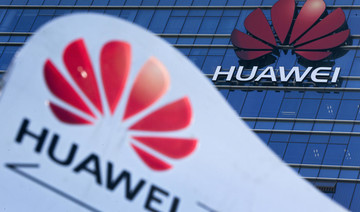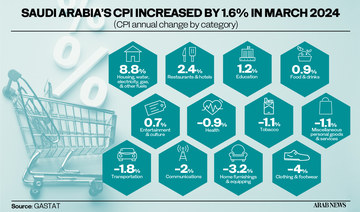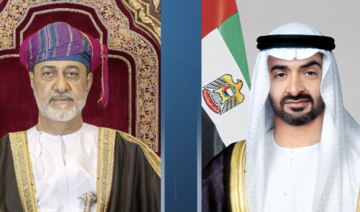SHENZHEN, China: Chinese tech giant Huawei is challenging a US law that labels the company a security risk and would limit its access to the American market for telecom equipment.
Huawei Technologies’ lawsuit, announced Thursday, asks a federal court to throw out a portion of this year’s US military appropriations act that bars the government and its contractors from using Huawei equipment on the grounds it is unconstitutional.
It comes as the biggest global maker of network equipment for phone and Internet companies fights US efforts to persuade allies to exclude the company from next-generation telecom systems.
The complaint, filed in Plano, Texas, the headquarters of Huawei’s US operations, cites the framers of the US Constitution, including Alexander Hamilton and James Madison, in arguing that the law in question violates the constitutional separation of powers, denies due process and amounts to a “Bill of Attainder” that singles out a specific entity for adverse treatment.
It says the law causes the company “concrete and particularized injury, and imminent future injury” and subjects it to a “burden that is severe, permanent and inescapable” that amounts to the corporate “death penalty.”
Huawei, China’s first global tech brand, is at the center of US-Chinese tensions over technology competition and cyber-spying. The company has spent years trying to put to rest accusations it facilitates Chinese spying or is controlled by the ruling Communist Party.
Increasingly, both sides appear to be resorting to courts to try to press their cases.
“We are compelled to take this legal action as a proper and last resort,” the company’s rotating chairman, Guo Ping, said at a news conference. Guo said the ban would limit competition, slowing the rollout of fifth-generation communications and raising consumer prices.
Huawei has pleaded not guilty to US trade-theft charges after a federal court in Seattle unsealed a 10-count indictment in January against two of its units, Huawei Device Co. and Huawei Device USA. The charges include conspiracy to steal trade secrets, attempted theft of trade secrets, wire fraud and obstruction of justice.
The company’s chief financial officer, Meng Wanzhou, is fighting extradition to the US after she was arrested in Vancouver, Canada on Dec. 1. US prosecutors have filed charges accusing Meng, who is the daughter of Huawei’s founder, of lying to banks about dealings with Iran.
Huawei denies any wrongdoing.
The company has about 40 percent of the global market for network gear but its US sales evaporated after a congressional panel in 2012 cited the company and a Chinese competitor, ZTE Corp., as security risks and told phone carriers to avoid dealing with them.
US authorities “have hacked our servers and stolen our emails” but have presented no evidence to support their security claims, Guo said. He complained Washington was “sparing no effort to smear” the company.
The US campaign to persuade allies to shun Huawei threatens to block access to major markets as phone carriers prepare to invest billions of dollars in 5G systems.
Huawei says the new law would shrink its potential US market further by prohibiting the government from buying the Chinese vendor’s technology and from buying goods or services from or giving grants or loans to companies or other third parties that do. The United States accounts for 20 to 25 percent of the global market for computer and telecom technology.
Huawei says the US law it is protesting improperly has Congress play the role of a court.
The ban is “based on numerous false, unproven and untested propositions,” said Song Liuping, the company’s chief legal officer, at the news conference. “Huawei has an excellent security record and program. No contrary evidence has been offered.”
The Chinese government says Washington fabricates or exaggerates security concerns to block competition.
Huawei, based in Shenzhen, near Hong Kong, is a leading developer of 5G along with rivals Nokia Corp. of Finland and Sweden’s LM Ericsson. Industry analysts say excluding the Chinese vendor from markets for 5G equipment would reduce competition and might lead to higher prices.
Founded in 1987 by a former military engineer, Huawei overtook Ericsson in 2017 as the biggest global supplier of network gear. It says it supplies 45 of the world’s top 50 phone companies and has contracts with 30 carriers to test 5G wireless technology.
European governments are balking at US pressure to ban Huawei. The company has announced contracts with customers including the United Arab Emirates in the Middle East for network technology.
China’s government arrested two Canadians, a former diplomat and a businessman, on Dec. 10 in what was widely seen as an attempt to pressure Canada to release Meng, the company’s CFO.
On Monday, Beijing accused the two men of acting together to steal state secrets. That followed the Canadian government’s announcement Friday that the extradition proceeding for Meng would be allowed to continue.
Huawei executives say American security warnings have yet to affect sales outside the United States. The company’s 2018 revenue forecast is $100 billion and its founder, Ren Zhengfei, said last month this year’s target is $125 billion.
Some European officials and others cite a Chinese security law requiring companies to cooperate with intelligence agencies. They say Huawei and other tech companies might be required to install “backdoors” in equipment to allow eavesdropping.
Huawei denies altering its equipment to facilitate spying and has set up testing centers in Britain, Canada and continental Europe to allow governments to examine its technology.
“Huawei has not and will never implant ‘backdoors,’” said Guo, the chairman.
The company also has launched a public relations campaign abroad.
Its typically press-shy founder, Ren, gave a two-hour interview to foreign reporters in January in which he said Huawei would reject Chinese government demands to disclose confidential information about its customers. Since then, Ren also has talked at length with foreign TV broadcasters.
China’s Huawei sues to challenge US security law
China’s Huawei sues to challenge US security law
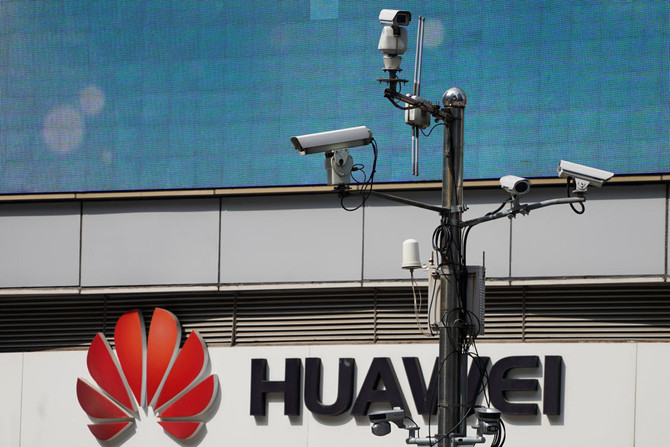
- Huawei is fighting US efforts to persuade allies to exclude the company from next-generation telecom systems
- ‘Huawei has not and will never implant ‘backdoors’’
Pakistan Stock Exchange hits record high, breaks 72,000 points in intraday trade
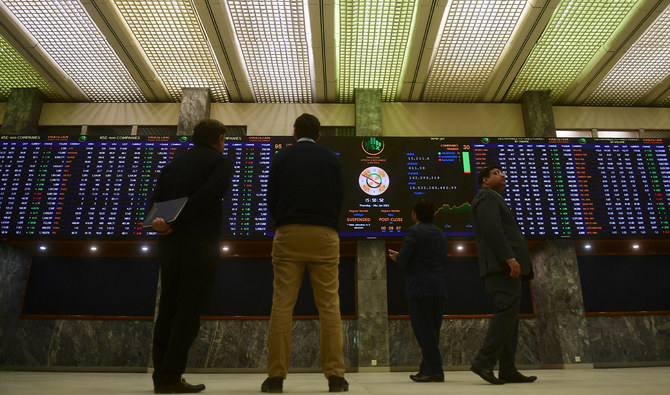
- Analysts say investors expect a significant decline in April inflation data that may lead to a cut in interest rates
- The Pakistani bourse has recently been trading at record highs due to hopes of positive loan talks with the IMF
ISLAMABAD: Pakistan’s benchmark share index breached the key level of 72,000 to trade at a record high of 72,414 points during intraday trade earlier on Wednesday, according to data from the Pakistan Stock Exchange website.
The Pakistani bourse has recently been trading at record highs amid positive sentiment prevailing among investors due to hopes of the country’s successful talks with the International Monetary Fund (IMF) for a new loan program.
The country’s finance minister, Muhammad Aurangzeb, recently visited Washington to hold talks with IMF officials for a long-term bailout facility as Pakistan’s current $3 billion program is due to expire this month.
The finance minister expressed hopes the outline of the new program would soon become visible, adding that the loan would help Pakistan continue with structural economic reforms.
“After a record current account surplus, investors are now expecting a big fall in April inflation data that may result in a cut in interest rates in the coming months,” Sohail Mohammed, CEO of Karachi-based brokerage company Topline Securities, told Reuters.
Pakistan’s benchmark KSE100 index has surged 75.5 percent over the past year and is up 11.5 percent year-to-date.
The equity market is expected to surge further as an IMF delegation arrives in Pakistan next month to determine the contours of the new loan facility.
“We are still hoping that we can get into a staff-level agreement [with the IMF] by the time June is done or early July so that we can move on,” the finance minister said on Tuesday while addressing a news conference in Islamabad.
With input from Reuters
Saudi Arabia’s non-oil exports surge by 4.4% in February: GASTAT
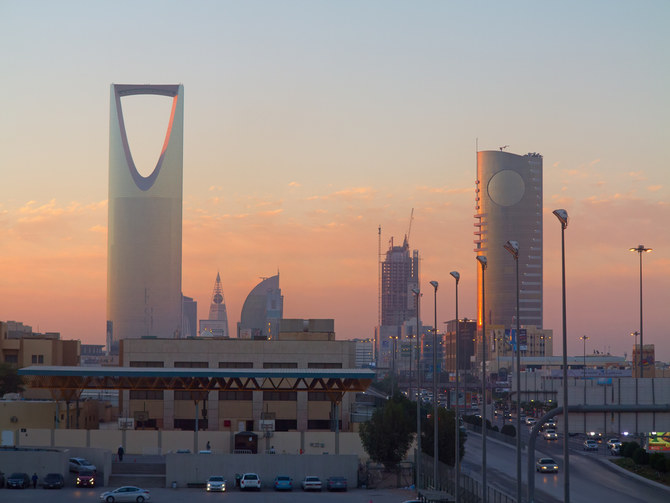
RIYADH: Saudi Arabia’s non-oil exports, including re-exports, saw a surge of 4.4 percent in February compared to the same period the previous year, official data showed.
According to the General Authority for Statistics, the total value of non-oil exports in February reached SR21.86 billion ($5.83 billion), marking a rise from SR20.93 billion in the corresponding period of the preceding year.
The increase in non-oil shipments was driven by an 8.3 percent surge in the exports of rubber and plastic products in February, constituting 24.1 percent of the total exports.
Strengthening the non-oil private sector remains pivotal for Saudi Arabia, as the Kingdom continues its economic diversification efforts aimed at reducing reliance on oil.
The report unveiled a 4.1 percent year-on-year decrease in the Kingdom’s non-oil exports, excluding re-exports, in February. Conversely, the value of re-exported goods surged by 32.3 percent during the same period.
However, GASTAT noted that Saudi Arabia’s overall merchandise shipments decreased by 2 percent in February compared to the year-ago period.
This decline was primarily attributed to a 3.8 percent decrease in oil exports in February compared to the same month in 2023, according to the report.
UBS gets green light to open Saudi branch for banking operations
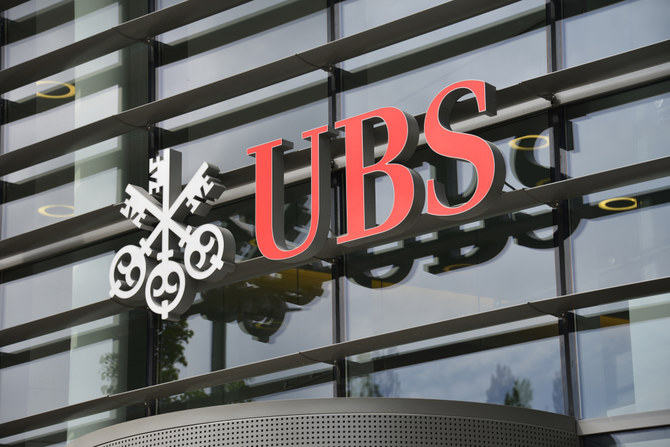
RIYADH: In a move aimed at enhancing Saudi Arabia’s financial landscape, the Kingdom has granted permission for a branch of the Swiss bank UBS to operate within the nation.
According to the Saudi Press Agency, the approval was granted during a session chaired by the Custodian of the Two Holy Mosques, King Salman bin Abdulaziz Al-Saud, held by the Cabinet in Jeddah on April 23.
The session commenced with King Salman briefing the Cabinet on the recent communications and discussions held between the Kingdom and several countries regarding shared relations, regional issues, and global developments, as reported by SPA.
In this context, the Cabinet reaffirmed Saudi Arabia’s steadfast stance toward promoting security and stability in the region and the world.
The Minister of Media, Salman bin Yousef Al-Dossary, stated in a press release following the session that the Cabinet praised the outcomes of the second ministerial meeting of the dialogue between the Gulf Cooperation Council countries and Central Asian countries.
He emphasized the Kingdom’s commitment to continue strengthening communication channels with various countries worldwide and supporting areas of joint coordination, including multilateral efforts.
Additionally, the Cabinet expressed its appreciation for the participants of the forthcoming World Economic Forum special meeting, set to take place in Riyadh in the upcoming week, highlighting the Kingdom’s dedication to encouraging global collaboration and tackling shared challenges.
Moreover, the Cabinet announced that the World Bank had selected Saudi Arabia as a center for knowledge dissemination to promote worldwide awareness of economic reforms, underscoring its leadership in achieving significant progress in global competitiveness indicators.
Al-Dossary further highlighted that the Cabinet applauded the achievement of five Saudi cities in obtaining advanced positions in the 2024 Smart Cities Index.
Following today’s session, the Cabinet approved cooperation agreements with Qatar, the Dominican Republic and the UK as well as Turkey, Chad, Portugal, Hong Kong, and Yemen.
Additionally, the body authorized discussions regarding statistical collaboration with Australia and maritime cooperation with Egypt. It also endorsed anti-corruption agreements with South Korea, archival partnerships with Greece, and financial technology collaboration with Singapore.
Authorization was granted for negotiations on science and technology cooperation with the Bahamas. A unified law for international road transport within GCC countries was approved, and additional compensation was granted to Tabah village’s affected families in the Hail region.
Furthermore, final accounts for various government entities were approved.
UAE and Oman establish $35bn investment partnerships across multiple sectors
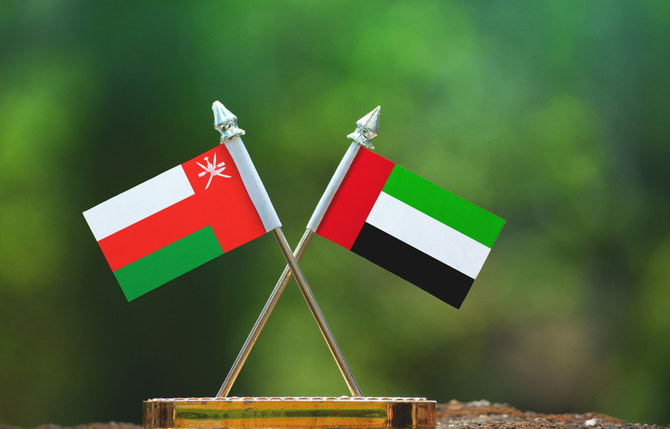
RIYADH: Trade and economic ties between the UAE and Oman are set to further strengthen thanks to the signing of investment deals worth 129 billion dirhams ($35.12 billion).
According to a press statement, these agreements cover multiple sectors, including renewable energy, green metals, railway, digital infrastructure, and technology investments.
Economic ties between the UAE and Oman have remained robust in recent years, with non-oil trade volumes reaching approximately 50 billion dirhams in 2023.
“The UAE and Oman have strong historical relations that are founded on shared values, goals and principles. The agreements represent a major milestone in our bilateral ties, as they pave the way for us to leverage our collective strength to realize our shared vision of advancement and prosperity,” said Mohamed Hassan Al-Suwaidi, UAE’s minister of investment.
One of the major agreements signed by both countries was an industrial and energy megaproject valued at 117 billion dirhams. This project encompasses renewable energy initiatives, including solar and wind projects, alongside green metals production facilities.
The deal’s signatories included Abu Dhabi National Energy Co., Abu Dhabi Future Energy Co., and Emirates Global Aluminium, as well as Emirates Steel Arkan, OQ Alternative Energy, and Oman Electricity Transmission Co.
Another agreement, valued at 660 million dirhams, was signed between Abu Dhabi Developmental Holding Co. and Oman Investment Authority to establish a technology-focused fund.
A UAE-Oman rail connectivity project, valued at 11 billion dirhams, was also inked by both countries.
Additionally, UAE’s Ministry of Investment and the Ministry of Commerce and Trade signed another deal with Oman’s Ministry of Investment Promotion to cooperate in multiple sectors, including digital infrastructure, food security, and energy.
Etihad Rail, Mubadala, and Omani Asyad Group Co. signed a shareholding partnership valued at 3 billion dirhams.
Both countries also announced the formation of a UAE-Oman alliance to enhance bilateral economic and trade relations.
The UAE’s Ministry of Investment, in the press statement, further noted that the signing of these agreements will serve to bolster relations across key sectors and foster socio-economic benefits, contributing toward a stable and prosperous future for both countries.
Influx of Chinese models to drive Mideast EV sales amid global surge
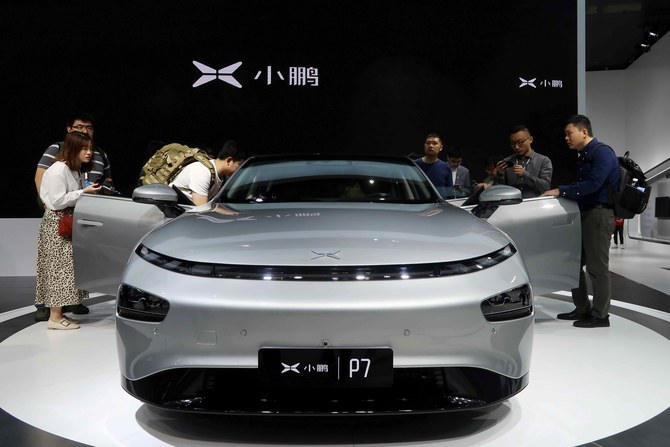
- The IEA report disclosed that global EV sales grew by approximately 25 percent in Q1 of 2024
RIYADH: The entry of Chinese car models in the Middle East could drive regional electric vehicle sales, as global figures are projected to reach 17 million units by 2024.
According to the latest International Energy Agency report, this marks a 21.42 percent increase from the previous year, with nearly 60 percent of new electric car registrations in 2023 occurring in China, followed by 10 percent in the US and 25 percent in Europe.
“The continued momentum behind electric cars is clear in our data, although it is stronger in some markets than others. Rather than tapering off, the global EV revolution appears to be gearing up for a new phase of growth,” said Fatih Birol, executive director of the IEA.
The Global EV Outlook 2024 stated that the electric car market in Africa, Eurasia, and the Middle East is still in its nascent stage, with such vehicles representing just under 1 percent of total sales in these regions.
However, the decision of Chinese carmakers to explore these regions, along with producing vehicles domestically, could change this trend, allowing the market to expand in the coming years.
“In Uzbekistan, BYD (Chinese automaker) set up a joint venture with UzAuto Motors in 2023 to produce 50,000 electric cars annually, and Chery International established a partnership with ADM Jizzakh,” stated the IEA in the report.
This partnership has already led to a steep increase in electric car sales in Uzbekistan, reaching around 10,000 in 2023.
It added: “In the Middle East, Jordan boasts the highest electric car sales share, at more than 45 percent, supported by much lower import duties relative to ICE (internal combustion engine) cars, followed by the UAE, with 13 percent.”
Moreover, in July last year, Saudi Arabia’s Ministry of Investment signed a $5.6 billion deal with Chinese electric car maker Human Horizons to collaborate on the development, manufacture, and sale of vehicles.
Steady growth
The IEA report disclosed that global sales of electric cars grew by approximately 25 percent in the first quarter of this year compared to the same quarter in 2023.
Highlighting the growth of the EV market, the report revealed that the number of electric cars sold globally in the first three months of this year is roughly equivalent to the total units sold in 2020.
The steady growth in the first quarter of this year was driven by China, with 1.9 million EVs sold, marking a 35 percent rise compared to the same period in 2023.
In Europe, the first quarter of 2024 witnessed year-on-year growth of over 5 percent, slightly surpassing the growth in overall car sales and thus maintaining the EV sales share at a similar level to that of last year.
The US also experienced a 15 percent increase in sales in this segment during the first three months of this year, compared to the same period in 2023.
According to Birol, the rise in investments in the electric battery sector is a strong indication of the rise of the EV appetite globally.
“The wave of investment in battery manufacturing suggests the EV supply chain is advancing to meet automakers’ ambitious plans for expansion. As a result, the share of EVs on the roads is expected to continue to climb rapidly,” said the executive director of IEA.
He added: “Based on today’s policy settings alone, almost one in three cars on the roads in China by 2030 is set to be electric, and almost one in five in both the US and the EU. This shift will have major ramifications for both the auto industry and the energy sector.”
EV prices to fall
The report highlighted that the pace of the transition to EVs may not be consistent and will hinge on affordability.
IEA added that manufacturers have taken significant steps to deliver on the strengthening EV ambitions of governments by making significant financial commitments.
“Thanks to high levels of investment over the past five years, the world’s capacity to produce batteries for EVs is well positioned to keep up with demand, even as it rises sharply over the next decade,” said the report.
According to the intergovernmental organization, more than 60 percent of electric cars sold in 2023 were already less expensive to buy than their conventional equivalents in China.
However, the purchase prices for cars with internal combustion engines remained cheaper on average compared to EVs in the US and the EU.
The report suggested that intensifying market competition and improving battery technologies are expected to reduce the prices of electric cars in the coming years.
“Even where upfront prices are high, the lower operating costs of EVs mean the initial investment pays back over time,” said IEA.
Moreover, growing electric car exports from Chinese automakers, which accounted for more than half of all electric car sales in 2023, could add to downward pressure on purchase prices.
IEA also underscored the vitality of ensuring the availability of public charging slots to maintain the steady growth of the electric car market globally.
According to the report, the number of public charging points installed globally was up 40 percent in 2023 compared to 2022, and growth for fast chargers outpaced that of slower ones.
However, IEA added that charging networks globally need to grow sixfold by 2035 to meet the level of electric vehicle deployment in line with the pledges made by governments.
“At the same time, policy support and careful planning are essential to make sure greater demand for electricity from charging does not overstretch electricity grids,” concluded the report.



